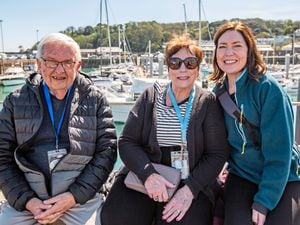‘These are the questions that must be asked’
As the States prepares to debate Policy & Resources’ green paper on tax, four of the Guernsey Party’s sitting deputies – John Dyke, Nick Moakes, Bob Murray and Simon Vermeulen – have asked ‘the questions that must be asked’. While they said they were not proposals, there are suggestions which, the deputies stated, ‘needed consideration and debate in order to reach the big tax decisions’

Borrowing
The party says that by 2025 almost two-thirds of the projected annual revenue deficit will be to fund infrastructure – £66m. of £87.4m.
‘Is funding it from revenue account the best way?’ they ask.
The group suggested infrastructure funding could instead be financed by long-term fixed-rate debt, perhaps over a 30-year term or structured as a bond, as it was ‘cheaper than ever before’.
‘There are many alternatives to the existing proposal of funding it via the revenue account,’ they say.
States property portfolio
With assets worth an estimated £2bn, and much of it surplus to requirements, generating no or negligible rental income, this is a sector ripe for review, say the deputies.
The deputies suggested looking at entering into partnerships with developers or selling off some States housing to tenants or for more affordable housing and care homes. They also put forward a potential sale and lease-back option for States property.
‘What is the point of the States holding onto unwanted and unneeded real estate? Raising cash from surplus real estate to fund future years of infrastructure spending is logical.’

States trading entities
States trading entities (excluding Aurigny) currently ‘leak’ at least £30m. a year in terms of earnings before interest, taxes, depreciation, and amortisation (Ebitda) losses – a £30m. a year subsidy from the taxpayer.
The deputies ask whether trading entities not already commercialised should be, and whether part-privatisation should be considered.
‘Outside investors would then be funding those businesses instead of the Guernsey taxpayer. Let’s face facts – States ownership of most (not all) of those businesses is hardly in the taxpayers’ interests if the taxpayer subsidises them by more than £30m. annually.’
Civil service
Under new leadership, with public sector reform and digitisation under way, the civil service could be seen as a positive. But is it as efficient as it could be, the deputies ask?
They question key performance indicators assessing employee performance, the opening up of vacancies to the private sector, procurement processes and performance management.
The deputies say that questions should be asked such as how many civil servants might take voluntary redundancy, or reduce to a four-day week, and suggest more could be done to help civil servants retrain for private sector administration roles rather than ‘seeing out their time’ until retirement.

Public sector pensions
The financial implications of the pension scheme deficit vary depending on accounting standards, from anything between £250m. and £1.6bn.
They asked whether longevity swaps to cap the States’ risk exposure on longevity would be appropriate. They also queried whether the career average scheme, approved several years ago, had ever been used for pre-existing employees, and whether scheme changes had gone far enough.
Discrimination legislation
The deputies have demanded clarity over the costs related to the legislation, its value, and what is intended to be funded by the estimated £50m. cost of equal pay for work of equal value.
‘Are members of the States clear about what benefits it will bring, what the full cost impact assessment is and whether we actually need it in anything like the form proposed? What would the impact be if we do not bring it in?’ they ask.
Zero-budgeting
All States departments should move to zero-budgeting, so that the practice of spending the remaining budget one year to ensure that it is secured for the next year is eradicated.

Benefits
The deputies called for a comprehensive review of what benefits are paid, to whom, and on what conditions.
‘Have we made “not working” a lifestyle choice for some, while not being able to pay enough for those in greater need? Can we do more to get the unemployed back into work?’
They queried the potential disincentive for some from earning more money because of the social housing earnings thresholds. ‘We must address... poverty traps caused by the benefits system.’
Population management
The quartet want the States to address population management issues urgently, claiming ‘we are in danger of losing large chunks of not just our hospitality industry, but also other important sectors’.
‘We all know that we need to grow the working population to counter the “demographic timebomb”, but we have to be able to fill existing vacancies.’
The deputies said the States must be able to turn the immigration and population growth tap on and off.
They advocate suspending elements of the Population Management Law for a year, while allowing a revised version to be quickly reintroduced as needed.
‘It is a law which was designed to keep people out, which is clearly not fit for purpose when we need to attract and retain key workers.’
Affordable housing
The States needs to get on with building more affordable homes – but the deputies consider it might be worth scrapping the planning policy around affordable housing, which enforces a certain percentage in major developments.
Its removal could speed up the increase in supply of new affordable housing, which would help to keep young islanders in Guernsey so that they did not also need to be replaced with imported workers.
Investigating offshore renewable energy
The deputies want exploration into the viability of exploiting offshore tidal or wind energy in Bailiwick waters to generate the islands’ electricity, with the potential to export surplus electricity.
‘Many of the vital elements needed for tidal and wind power generation are in our favour but have we been lazy in not really driving it as an initiative? We should certainly be fully investigating the viability before ruling it out.’
Attracting tax-generators
The deputies said they were seeking to ensure the tax regime remains ‘attractive’ to new arrivals in a very competitive market, and to ensure the island remained attractive to open market residents and entrepreneurs to create new jobs in diverse industries was vital.
‘These people will directly and indirectly generate substantial tax revenue. Are we doing enough to attract them?’





